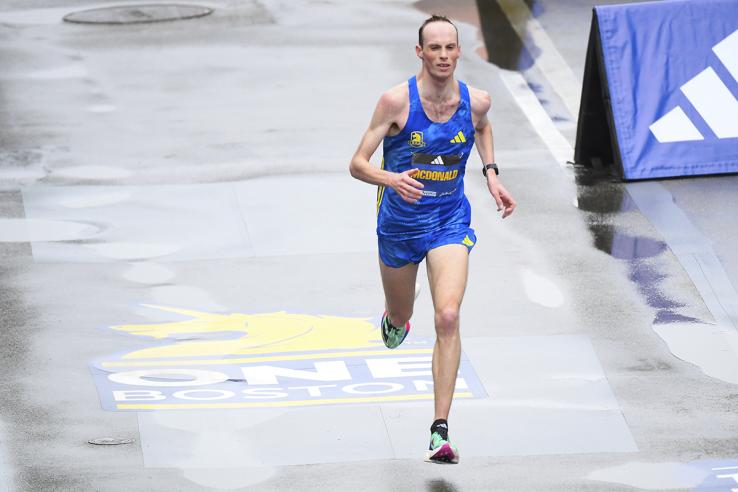
Matt McDonald ’15 excelled as a distance runner at Princeton, winning the 10,000 meters at the Ivy Outdoor Heptagonal Championships in his senior year, but he never looked like a speedster during workouts.
“We would kind of joke that I was the scooter — I would just scoot along because I don’t lift my legs very high while I’m running,” he said. “But I guess it’s a very efficient stride. So if you spread that out over 26 miles, good things can happen.”
McDonald’s talent for understatement rivals his elite running skills: Since taking up the marathon in 2017, he has become one of the United States’ fastest competitors, and on Feb. 3, he will compete at the U.S. Olympic Marathon Trials in Orlando for one of the country’s three berths in this summer’s Paris Olympics. His qualifying time, 2:09:49 at the 2022 Bank of America Chicago Marathon, ranks 11th among more than 100 runners entered in the race.
Four years ago, at the 2020 Olympic trials in Atlanta, McDonald finished 10th in just his fourth full marathon. In 2023, he had one of his strongest seasons: He was the second-fastest American man in the Boston Marathon in April (10th overall), edging U.S. distance star Conner Mantz, and at the Chicago Marathon in October, he was sixth among American men (13th overall).
McDonald has done all of that while managing a demanding schedule away from training. In 2020, he completed a Ph.D. in chemical engineering at Georgia Tech, where his work included developing economical ways to produce antibiotics on a small scale and circumvent supply-chain disruptions — a project that gained relevance during the COVID pandemic. In his current role as a postdoc at MIT, he is part of a team that uses machine learning to analyze molecules, developing a process that could eventually be applied in drug discovery. Their research was recently published in the journal Science. In September, McDonald will begin teaching at Drexel.
“When it comes down to it, I really enjoy learning, especially about science,” McDonald said. He’s far more likely to scroll through articles about science than he is to check on the latest running news. And while having a full-time job might be less than ideal from a training standpoint, he sees advantages to having multiple priorities in his life.
As Jason Vigilante, the head coach of Princeton men’s track and field, told PAW, “I’ve found that being industrious and thoughtful throughout the day actually helps training for distance runners.” The Tigers’ success in cross country and distance events supports that theory. Even in a community of academically motivated athletes, McDonald stood out, according to Vigilante. He managed his time, was always willing to take on the most challenging workouts, and in competition, displayed uncommon patience. Those skills have translated well in his marathon career.
For at least 10 months of the year, McDonald said, there’s no question that his job comes first and training fits around his work schedule. He often plans runs that also function as his morning commute. “I don’t have to sit on the train for 25 minutes,” he said. “So I actually prefer it to commuting by the T. But still, it can be quite exhausting.”
This month is an exception to the usual balancing act. Since late December, McDonald has been living in Tallahassee, Florida, working remotely as he trains with teammates from the Boston Athletic Association to get ready for the Olympic trials. He ran the eight-mile loop that will be used for the trials while visiting Orlando for a chemical engineering conference in November.
McDonald is engaged to another elite runner, Maegan Krifchin, who has also qualified for the marathon trials. “It’s fantastic having a partner that understands what running is and what you’re going through,” he said. “And she’s really a great influence on me. … I have a terrible sweet tooth, and she’ll be the one to be like, you don’t need the entire pint of Ben & Jerry’s right now, you can eat the other half of it tomorrow.”
Looking ahead to the trials, McDonald said he’ll try to offload the strategy to his coach and focus on his training and some of the mental aspects of a well-run race.
“Marathon training definitely has a cumulative effect,” he said. “Cycle after cycle of running marathons, I feel that aerobically I am far more powerful today than I was four years ago. That said, I also look at the competition today and see that they are performing better than ever. … I know that I can run better, but I know that I’ll also have to work harder, and hurt harder, in order to achieve my goals.”
